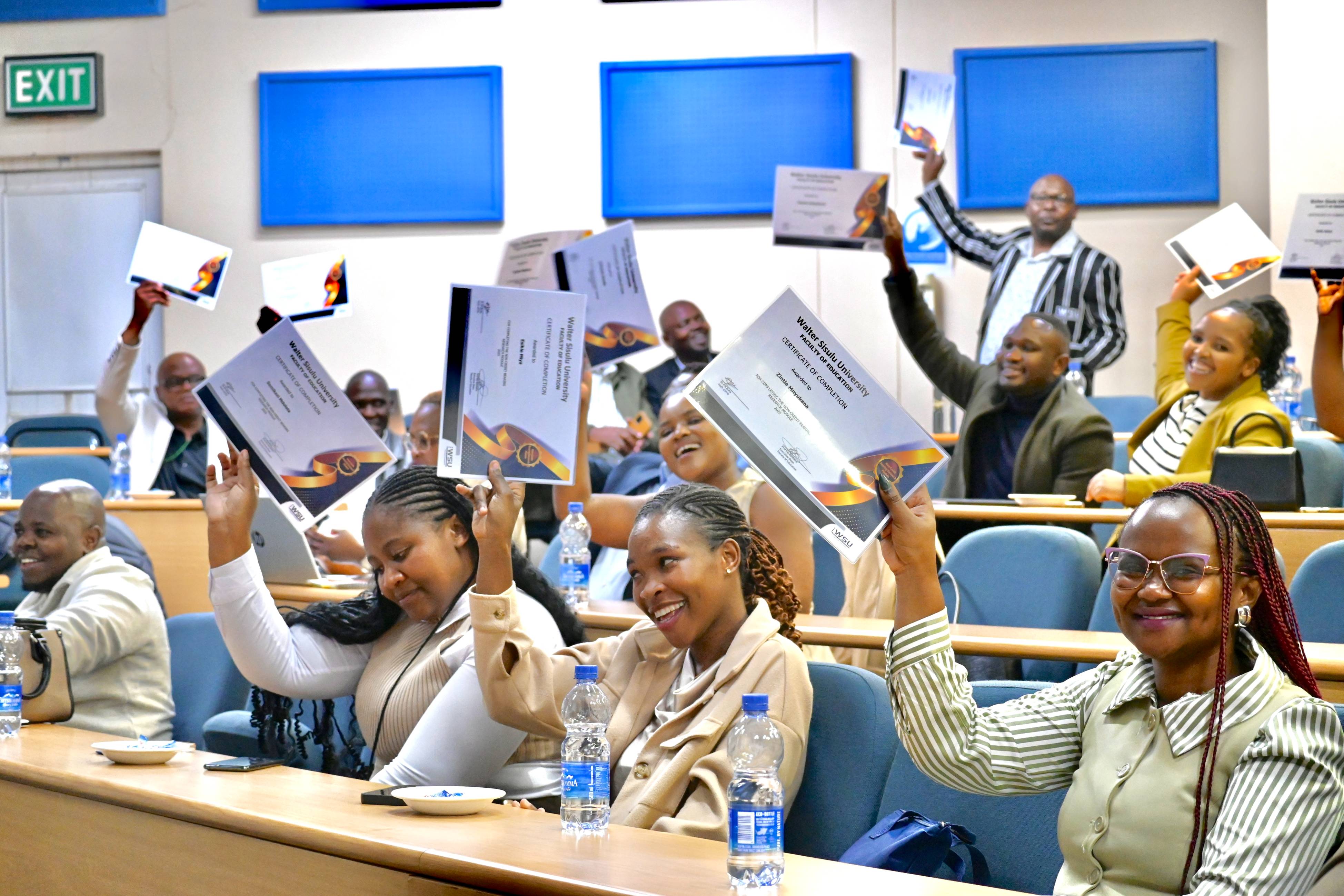NEW WSU MODULE PREPARES POSTGRADUATES FOR RIGOROUS RESEARCH APPROVAL

Walter Sisulu University continues to ramp up its efforts to equip its postgraduate students with the knowledge and skills to craft well-structured research proposals that meet the rigorous standards of the university’s Faculty and Senate research and ethics committees.
As such, a group of Master’s and Doctoral candidates were recently subjected to a non-credit bearing research proposal workshop to sharpen their skills and capacity.
The event marked a significant step in strengthening WSU’s postgraduate research culture, bringing together aspiring scholars, supervisors, and research leaders to reflect on the values of academic excellence, integrity, and impact.
It was hosted by the Department of Continuing Professional Teacher Development (CPTD) under the Faculty of Education.
The Master’s and Doctoral Proposal Module Development certification programme was held under the theme: “Seeds of Scholarship-Cultivating Future Leadership in Research.”
Under the programme, at least 27 Master’s and Doctoral candidates have been cleared to embark on developing research proposals that meet the standards required for approval by the departmental, faculty higher degrees, senate higher degrees, and ethics committees, ensuring timely progress in their academic journeys.
Delivering the keynote address, the Deputy Vice-Chancellor for Research, Innovation and Partnerships, Professor Nosisi Feza, described this as a profound journey of transformation, one that demands courage, discipline, and a commitment to societal impact.
“Postgraduate studies are not just about acquiring a qualification. They mark a transition from being a student to becoming a professional: a thinker, a problem-solver, and a contributor to the world of knowledge,” said Feza.
She urged students to approach their research with responsibility and pride, stressing that quality work is both a reflection of self-respect and respect for one’s supervisor.
“We must not settle for mediocrity,” Feza said before adding that “your supervisors demand excellence not to challenge you unfairly, but because they see your potential to contribute meaningfully.”
Meanwhile, the Executive Dean of the Faculty of Education, Prof Bongani Bantwini, highlighted the central role of research in driving innovation, addressing educational challenges, and producing graduates who are globally competitive yet responsive to local needs.
He said, "Education extends beyond certificates, it is about cultivating knowledge, skills, and values that inspire excellence in teaching and learning."
Encouraging students to pursue transformative and contextually relevant research, Bantwini urged them to engage critically with literature, remain curious, and sustain their academic journeys through ongoing dialogue and persistence; qualities he described as vital to lifelong learning.
-By Ongezwa Sigodi
Walter Sisulu University continues to ramp up its efforts to equip its postgraduate students with the knowledge and skills to craft well-structured research proposals that meet the rigorous standards of the university’s Faculty and Senate research and ethics committees.
As such, a group of Master’s and Doctoral candidates were recently subjected to a non-credit bearing research proposal workshop to sharpen their skills and capacity.
The event marked a significant step in strengthening WSU’s postgraduate research culture, bringing together aspiring scholars, supervisors, and research leaders to reflect on the values of academic excellence, integrity, and impact.
It was hosted by the Department of Continuing Professional Teacher Development (CPTD) under the Faculty of Education.
The Master’s and Doctoral Proposal Module Development certification programme was held under the theme: “Seeds of Scholarship-Cultivating Future Leadership in Research.”
Under the programme, at least 27 Master’s and Doctoral candidates have been cleared to embark on developing research proposals that meet the standards required for approval by the departmental, faculty higher degrees, senate higher degrees, and ethics committees, ensuring timely progress in their academic journeys.
Delivering the keynote address, the Deputy Vice-Chancellor for Research, Innovation and Partnerships, Professor Nosisi Feza, described this as a profound journey of transformation, one that demands courage, discipline, and a commitment to societal impact.
“Postgraduate studies are not just about acquiring a qualification. They mark a transition from being a student to becoming a professional: a thinker, a problem-solver, and a contributor to the world of knowledge,” said Feza.
She urged students to approach their research with responsibility and pride, stressing that quality work is both a reflection of self-respect and respect for one’s supervisor.
“We must not settle for mediocrity,” Feza said before adding that “your supervisors demand excellence not to challenge you unfairly, but because they see your potential to contribute meaningfully.”
Meanwhile, the Executive Dean of the Faculty of Education, Prof Bongani Bantwini, highlighted the central role of research in driving innovation, addressing educational challenges, and producing graduates who are globally competitive yet responsive to local needs.
He said, "Education extends beyond certificates, it is about cultivating knowledge, skills, and values that inspire excellence in teaching and learning."
Encouraging students to pursue transformative and contextually relevant research, Bantwini urged them to engage critically with literature, remain curious, and sustain their academic journeys through ongoing dialogue and persistence; qualities he described as vital to lifelong learning.
By Ongezwa Sigodi
